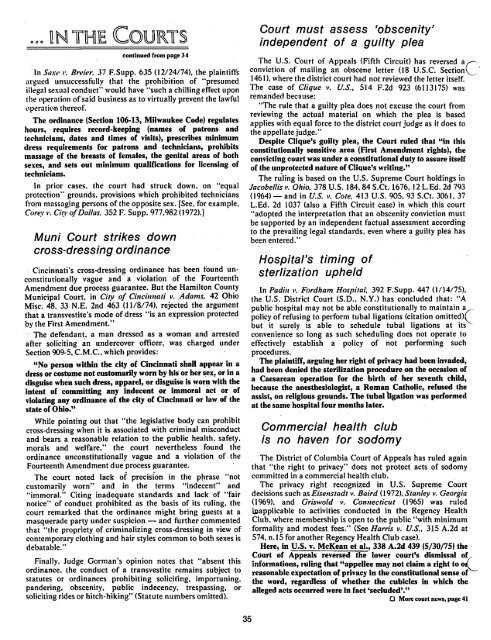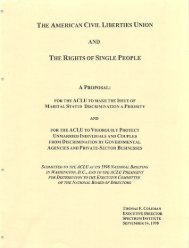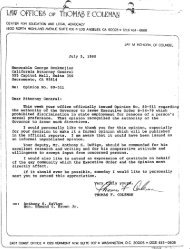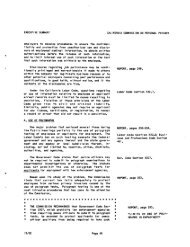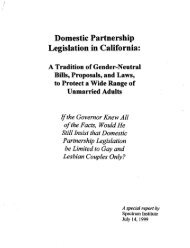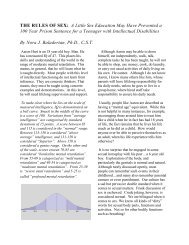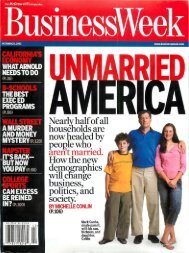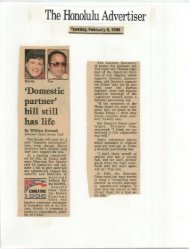1975 - Unmarried America
1975 - Unmarried America
1975 - Unmarried America
You also want an ePaper? Increase the reach of your titles
YUMPU automatically turns print PDFs into web optimized ePapers that Google loves.
000<br />
continued from page 34<br />
In Saxe i'. Breier. 37 F.Supp. 635 (12/24/74). the plaintiffs<br />
argued unsuccessfully that the pr~hibition of "presumed<br />
illegal sexual conduct" would have "such a chilling effect upon<br />
the operation of said business as to virtually prevent the lawful<br />
operation thereof.<br />
The ordinance (Section 106-13, Milwaukee Code) regulates<br />
hours, requires record-keepJng (names of patrons, and<br />
technicians, dates and times of visits), prescribes, minimum<br />
dre~s requirements. for patrons and technicians, prohibits<br />
massage of the breasts of females, the genital areas of both<br />
sexes, and sets out minimum qualifications for licensing of<br />
technicians.<br />
In prior cases. the court had struck down. on "equal<br />
protection" grounds. provisions which prohibited technicians<br />
from massaging persons of the opposite sex. (See. for example.<br />
Corey 1'. Ci~\' of Dallas. 352 F. Supp. 977.982 (t 972).]<br />
Muni Court strikes down<br />
cross-'dressing ordinance<br />
Cincinnati's cross-dressing ordinance has been found unconstitutionally<br />
vague and a violation of the Fourteenth<br />
Amendment due process guarantee. But the Hamilton County<br />
Municipal Court. in, Ci~v of Cincillnati v. Adams, 42 Ohio<br />
M·isc.- 48. 33, N.E. 2nd 463 (11/8/74). rejected the argument<br />
that a transvestite's mode of dress "is an expression protected<br />
by the First Amendment."<br />
, " The 'defendant. a man dressed as a woman and arrested<br />
after soliciting' an undercover officer. was charged under<br />
Section 909-5, C.M.C .• which provides:<br />
"No p'erSon within, the city of Cincinnati shall appear in, a<br />
dress or cosh.Jme not custoniarily ~orn by his or her ~ex, or in a<br />
disguise when such dress, apparel, or disguise is wor':l ~ith the<br />
intent of committing any indecent or immoral act or of<br />
violating any ordinance of the city of Cincinnati or law of the<br />
state of 0 hio."<br />
While pointing out that "the legislative body can prohibit<br />
cross-dressing when it is associated with criminal misconduct<br />
and bears a reasonable relation to the public health. safety.<br />
morals and welfare." the court nevertheless found the<br />
ordinance unconstitutionally vague and a violation of the<br />
Fourteenth Amendment due process guarantee.<br />
'<br />
The court noted lack of precisfon in the pttrase "not<br />
customarily worn It and in the terms "indecent" and<br />
··immoral." Citing inadequate standards and' lack of "fair<br />
notice" of conduct prohibited as the basis of its ruling, the<br />
cou'rt remarked that the ordinance might bring guests at a<br />
masquerade party under suspicion --.,. and further commented<br />
that "the propriety of criminalizing cross-dressing in view of<br />
contemporary clothing and hair styles common 'to both sexes is<br />
debatable." .<br />
Finally, Judge Gorman's opinion notes that "absent this<br />
ordinance, the conduct of a transvestite remains subject to<br />
statutes or ordinances prohibiting soliciting. importuning,<br />
pandering. obscenity, public indecency, trespassing. or<br />
soliciting rides or hitch-hiking" (Statute numbers omitted).<br />
Court must assess lobscenity'<br />
independent of a guilty plea<br />
The U.S. Court of Appeals (Fifth Circuit) has reversed a c·<br />
conviction of mailing an obscene letter (18 U.S.C. Section<br />
~.'<br />
1461), where the district court had not reviewed the letter itself.<br />
The case of Clique lI. U.S.. 514 F.2d 923 (6113175) was<br />
remanded because:<br />
"The rule that a 'guilty plea does not excuse the court from<br />
reviewing the actual material on which the plea is based<br />
applies with equal force to the district court judge as it does to<br />
the appellate judge."<br />
Despite Clique's guilty plea, the Court ruled that "in this<br />
constitutionally sensitive area (First Amendment rights), the<br />
convicting court was under a constitutional duty to assure itself<br />
of the unprotected nature of Clique's writin2."<br />
The ruling is based on the U.S. Supreme Court hold'ings in<br />
lacobellis 1'. Ohio. 378 U.S. 184,84 S.Ct. 1676, 12 L.Ed. 2d 793<br />
(1964) - and in U.S. lI. Cote, 413 U.S. 905. 93 S.Ct. 3061. 37<br />
L.Ed. 2d 1037 (also a Fifth Circuit case) in which. this court<br />
"adopted the interpretation that an obscenity conviction must<br />
be supported by an independent factual assessment according<br />
to the prevailing legal standards, even where a guilty plea has<br />
been entered." '<br />
Hospital's timing of<br />
sterlization upheld<br />
In Padi" lI. Fordham Hospital, 392 F.Supp. 447 (1/14/75).<br />
the U.S. District Court (S.D., N.Y,) has concluded that: HA<br />
public hospital may not be able constitutionally to maintain aC "<br />
policy of refusing to perform tubal ligations (citation omitted)<br />
but it surely is able to schedule tubal ligations at its<br />
convenience so long as such sched uling does not operate to<br />
effectively establish a policy of not performing such<br />
procedures.<br />
The plaintiff, arguing her right of privacy had been invaded,<br />
had been denied the sterilization procedure on the occasion of<br />
a Caesarean operation for the birth of her seventh child,<br />
because the anesthesiologist, a Roman Catholic, refused the<br />
assist, on religious grounds. The tubal ligation was performed<br />
at the same hospital four months later.<br />
Commercial health club<br />
is no haven for sodomy<br />
The District of Columbia Court of Appeals has ruled again<br />
that "the right to privacy" does not protect acts of sodomy<br />
committed in a commercial health club.<br />
The privacy right recognized in U.S. Supreme Court<br />
decisions such as Eisenstadt v. Baird (1972), Stanley v. Georgia<br />
(1969), and Griswold v. Connecticut (1965) was ruled<br />
iJ;lapplicable to activities conducted in the Regency Health<br />
Club. where membership is open to the public "with minimum<br />
formality and modest. fees." (See Harris v. U.S., 315 A.2d at<br />
574. n.l 5 for another Regency ~ealth Club case).<br />
Here, in U.S. v. McKean et al., 338 A.2d 439 (S/30/7S) the<br />
Court of Appeals . reversed the lower court's dismissal of<br />
informations, ruling'that "appellee ~ay not claim a right to oL<br />
reasonable expectation of privacy in the constitutional sense.of<br />
the word, regardiess of whether the' cubicles in which the<br />
alleged acts occurred were iii fact 'secluded'."<br />
o More court news, page 41<br />
35


